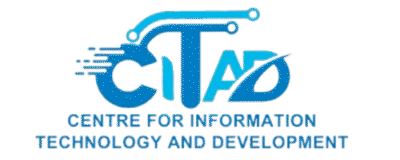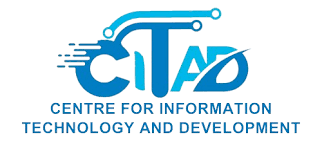Date: 13th October, 2025
Venue: Prof. Beckman Hall, CITAD Kano Office
Prepared by:Zainab Salihu Usman
Opening Remarks
The Centre for information Technology and Development (CITAD) on October 13th 2025 carried-out the first session of the digital tech forum. On behalf of the Centre for Information Technology and Development (CITAD), the co’ordinator, Fatima Babakura warmly welcomed everyone to the inaugural session of the Digital Tech Policy Forum.
Noting that technology continues to transform every aspect of our lives from governance and education to business and communication. Yet, this transformation comes with challenges that require timely and inclusive policy responses.
CITAD established this Forum to bring together researchers, academics, policymakers, civil society, digital professionals and policy makers and implementers to deliberate, learn, and collectively shape digital policy directions in Nigeria and beyond.
Fatima expressed that the inaugural meeting of the forum would focus on the theme “Towards a National AI Policy.” She thanked all participants for their presence and encouraged them to share insights freely as the group explores how to make Nigeria’s digital future more inclusive, ethical, and beneficial to all.
Statement of Purpose — Fatima Babakura
Fatima explained that the Digital Tech Policy Forum was established by CITAD to respond to the rapidly evolving digital landscape that calls for informed and inclusive policymaking.
The Forum aims to:
- Raise awareness about the importance of participatory digital policy.
- Promote critical analysis of existing frameworks.
- Generate actionable recommendations to guide policy design and implementation.
Through monthly deliberations, the Forum will produce policy briefs, conduct research, and provide critiques on key issues shaping Nigeria’s digital ecosystem from Artificial Intelligence (AI) and data governance to cybersecurity and digital rights.
Ultimately, the Forum seeks to ensure that Nigeria’s technology policies are people-centered, equitable, and responsive to local realities.
Background
The roundtable was convened as part of a broader conversation on Artificial Intelligence (AI) and its intersection with innovation, governance, research, and local realities.
Discussions centered on how AI is reshaping global systems and the implications for developing societies like Nigeria.
Participants from academia, media, civil society, tech industry professionals and policy institutions engaged in deep reflection on data quality, human oversight, ethical implications, and moral dimensions of technology exploring how Nigeria can develop a national AI policy that fits its local context.
Why We Need a National Policy — By Engr. Haruna Rabi’u
Engr. Haruna Rabi’u of combine telecoms solution network(CTSN) discussed the infrastructural and systemic challenges that impact Nigeria’s digital and telecommunication ecosystem. He argued that AI will need a robust telecommunication infrastructure to ride upon. He noted that while the world enjoys advanced connectivity, Nigeria faces challenges arising from poor transmission networks, fiber cuts, power shortages, and inadequate infrastructure planning.
Key points included:
- Frequent fiber optic cuts, numbering up to 500 incidents in a week for some telecom companies, cause major outages and financial losses.
- Telecom companies spend heavily on maintenance and power (diesel and solar), costs that are passed on to subscribers.
- Right-of-way disputes between states and telecom companies increase operational costs and reduce service quality.
- Lack of coordinated infrastructure policies leads to service disruptions and inefficiencies.
He emphasized that these challenges highlight the urgent need for a national policy that harmonizes regulations, protects investments, and ensures affordable and reliable services.
Current State of Regulation and Instruments — By Y.Z. Ya’u, Executive Director, CITAD
Dr. Ya’u noted that Nigeria’s tech policy environment remains fragmented and burdened by overlapping interests between state governments and telecom operators.
Key issues raised include:
- States viewing telecom infrastructure as revenue sources rather than critical national assets.
- Right-of-way charges and uncoordinated policies increasing operational costs for service providers.
- The need to protect telecom investments to prevent frequent service interruptions and customer dissatisfaction.
- A lack of harmonized infrastructure policies, which leads to inconsistent governance and inefficiency.
- The lack of national AI Policy. He talked about the current state of things with respect to regulatory mechanisms, pointing while we have a strategy document, we do not have a policy, noting that the normal thing was for policy to come first before a strategy but Nigeria started with a strategy. We also have three AI bills currently in the NationalAssembly, all aiming for ethical deployment of AI
- AI policy would also have implication on other technology related policies, necessitating their reviews, pointing that this needs to be done urgently because already people and organizations are using AI
He cited Ghana’s example, where a national policy mandates utilities to be placed on one side of the road to prevent cable damage a model Nigeria could adopt.
National AI Governance and Policy Gaps
Nigeria currently lacks a formal national AI policy, creating confusion around accountability, regulation, and ethical oversight.
Key issues identified:
- Existing efforts are based on an AI strategy, not a policy leaving regulatory gaps.
- The AI strategy’s goals growth promotion, technology leadership, and responsible AI use remain unimplemented due to weak coordination.
- Misinformation undermines public trust in AI.
- Laws under debate in the National Assembly are not aligned with the AI strategy, risking ineffective regulation.
- There is no clear accountability framework for AI harms, such as biased algorithms, fake media, or misinformation.
- A lack of trained personnel to evaluate and audit AI systems increases risks.
Recommendation:
Nigeria must begin with a clear national AI policy that defines responsibilities, accountability mechanisms, and ethical standards before enacting laws.
General Discussion
Key Issues
The general discussion section featured multiple expert contributions that collectively explored the technical, ethical, educational, and contextual dimensions of Artificial Intelligence (AI).
Speakers traced AI’s evolution from simple rule-based systems to modern Large Language Models (LLMs) such as ChatGPT and Copilot, emphasizing that while AI represents a remarkable technological advancement, it remains imperfect and susceptible to errors or “hallucinations.”
A number of critical issues emerged across the presentations:
- Data Reliability and Integrity:
AI systems depend heavily on the quality of data they are trained on. Inaccurate, biased, or incomplete data leads to unreliable outputs and flawed decision-making. - Human Oversight and Ethical Accountability:
Despite AI’s automation capabilities, human judgment remains essential to guide, monitor, and verify AI outputs. Overreliance on AI without moral or ethical control can lead to intellectual and social harm. - Academic and Research Integrity:
Participants raised concerns over the misuseof AI in academia, particularly the fabrication of data, plagiarism, and manipulation of citations. This trend threatens scholarly credibility and calls for clear institutional frameworks to regulate AI use in research and publication. - Contextual Relevance and Local Adaptation:
Nigeria’s current dependence on foreignAI models was identified as problematic because these systems are built around external cultural, linguistic, and economic contexts. There is a pressing need to ensure localization of AI policies, tools, and datasets that reflect Nigerian realities. - Institutional Capacity and Interdisciplinary Collaboration:
Many Nigerian universities and research centers lack the infrastructure, training programs, and collaborative culture necessary to handle emerging AI technologies ethically and effectively. - Digital Literacy and Lifelong Learning:
The discussions highlighted a gap in continuous learning and digital adaptation. Many professionals stop updating their knowledge after obtaining academic qualifications, limiting their ability to thrive in a fast-evolving digital environment. - Moral and Social Responsibility:
Across the board, participants agreed that technology must serve humanity and that morality should guide innovation. The moral deficit within society is often mirrored in how technology is used hence, AI development must remain grounded in ethics and human values.
Consolidated Recommendations
From the diverse discussions, the following recommendations were jointly emphasized as pathways toward responsible and sustainable AI development in Nigeria:
- Develop a Comprehensive National AI Policy:
Create a coordinated, context-specific policy framework that addresses ethics, accountability, data governance, and innovation while aligning national laws with global best practices. - Ensure Data Quality and Transparency:
Establish national standards and verification systems for data accuracy, integrity, and accessibility, ensuring AI outputs are reliable and trustworthy. - Promote Responsible Academic and Institutional Use:
Implement institutional AI ethics policies across universities and research institutions to prevent plagiarism, data manipulation, and other academic misconduct. - Build Localized AI Frameworks:
Develop AI models and solutions grounded in local realities, including cultural values, languages, and socioeconomic contexts, rather than importing foreign systems wholesale. - Integrate AI Literacy and Ethics into Education:
Embed AI ethics, critical thinking, and data literacy into school and university curricula to prepare students and professionals for ethical AI engagement. - Enhance Research and Collaborative Infrastructure:
Strengthen research capacity and promote interdisciplinary collaboration among technologists, social scientists, ethicists, and policymakers. - Foster Continuous Learning and Professional Development:
Encourage lifelong learning and promote access to digital literacy and mentorship programs for professionals to stay relevant in the AI-driven future. - Anchor AI Development in Human Morality:
Reaffirm that AI should augmentnot replacehuman intellect, ensuring technology remains guided by social responsibility, moral discipline, and ethical consciousness.
Commissioner’s Remarks-Honarable Commissioner, Dr. Yusuf Ibrahim Kofar Mata of Science, Technology and Innovation, Kano
The Commissioner Science, Technology and Innovation, Kanocommended CITAD for its leadership in digital policy development and acknowledged the importance of the Tech Policy Forum as a platform for critical engagement.
He emphasized that AI is here to stay, and societies must adapt proactively. While developed nations are creators of technology, countries like Nigeria must not remain passive users. Instead, they must formulate policies, guidelines, and ethical frameworks to govern AI use responsibly.
In academia, he stressed the need for authenticity and originality, drawing from his personal experience where his supervisor insisted on project originality without AI dependence.
He advised that AI should enhance, not replace, human intellect, and encouraged universities to teach responsible AI use.
He concluded by calling for vigilance, moral discipline, and originality in all academic and professional practices.
Moderator’s Closing Summary — Fatima Babakura
In closing, Fatima Babakura summarized that while AI is inevitable, its development must be guided by human morality and ethical consciousness.
Key Takeaways:
- AI’s future must be human-centered and value-driven.
- The quality of human input determines AI reliability.
- Ethical grounding is the true safeguard against misuse.
- Developing societies like Nigeria must adopt AI intelligently, rooted in local realities.
She thanked all participants and affirmed that insights from this discussion would inform future policy dialogues and research on AI governance.
Final Recommendations Summary
- Develop a National AI Policy Framework to align laws and ethics.
- Establish data quality and verification standards.
- Integrate AI ethics and literacy into all levels of education.
- Promote local AI research and innovation tailored to Nigerian realities.
- Encourage continuous learning and capacity building.
- Build multi-stakeholder collaboration between academia, government, and the private sector.
- Anchor all AI development in human morality and social responsibility.


